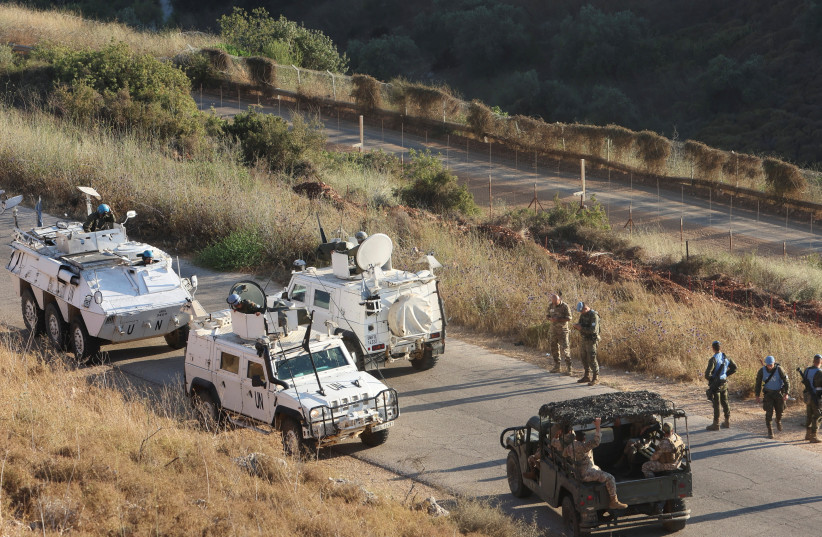Hezbollah-affiliated cleric Sheikh Sadiq al-Nabulsi stated that a war with Israel could "deliver" Lebanon from its ongoing political and economic crisis in an interview with the Lebanese Al-Jadeed TV earlier this month, according to a translation published by MEMRI.
"The existence of Israel is an act of war against us. It is not Hezbollah that is instigating war. You spoke earlier about the firing of rockets, and so on. The very existence of Israel is an aggression against Lebanon," said Nabulsi. "A war with Israel can deliver us from our crisis. Some people may ask how a war with Israel may bring us out of this crisis."
The cleric pointed to the ongoing stalemate in attempts in Lebanon to elect a president, stating the "If despite the dialogue and the various understandings and initiatives, we are unable to reach a formula for electing a president, war could turn out to be the best way to change the equation."
Nabulsi noted that "War is essentially a political act that seeks to change the balance of power, right?"
When asked if he thinks Hezbollah should launch a war against Israel, Nabulsi responded "Yes, Hezbollah and the resistance want to change the balance of powers in Lebanon and in the region, and we should not be ashamed or afraid to say this."

Tensions continue to rise along the Lebanese-Israeli border
Nabulsi's statements came amid heightened tensions along the Lebanese-Israeli border.
About two months ago, armed Hezbollah operatives set up two tents in Israeli territory in the Shebaa Farms area, with the act revealed to the public in mid-June. Israel has reportedly been conducting extensive diplomatic efforts through UNIFIL to convince Hezbollah to move the tents back into Lebanese territory, but Hezbollah and Lebanese officials have insisted that the area the tents are currently located in belongs to Lebanon. The tents as of Thursday have not been disturbed.
During a speech on last week, Hezbollah Secretary-General Hassan Nasrallah stressed that Israel “would not dare” to act against the tents, as Hezbollah would respond to any such action.
Nasrallah reiterated the claim that the tents are located in Lebanese territory, not Israeli territory, adding that the tents were only put up after Israeli authorities began building a fence around the village of Ghajar, which is split in half by the Blue Line with half in Lebanon and half in Israel.
Additionally, scuffles have repeatedly broken out between Lebanese citizens and Israeli forces along the Lebanese border in recent weeks.
Shortly before Nasrallah's speech, three Hezbollah members were reportedly injured after attempting to damage the border fence. Nasrallah stated that the incidents were "under investigation" and stressed that "necessary measures" would be carried out once the investigation was completed.
Nasrallah additionally demanded that Israel withdraw from the northern part of Ghajar, as well as the Shebaa Farms area, the Kfarchouba hills, and any other disputed locations along the border.
Two weeks ago, an anti-tank missile was fired toward the village of Ghajar, which is split in half by the Blue Line. In response to the missile fire, the IDF launched artillery strikes on sites near the towns of Kfarchouba and Halta. Over 15 shells were fired by the IDF toward southern Lebanon, according to Lebanon's National News Agency.
On Thursday evening, a fire broke out along the border near the town of Blida, south of Kiryat Shemona, with Hezbollah-affiliated reporter Ali Shoeib blaming Israeli forces for the blaze.
Additionally, Lebanese soldiers, Israeli soldiers, and UNIFIL personnel went on alert in the Kfarchouba area after Lebanese citizens began paving a road near an Israeli concrete barrier set up near the Blue Line. Israeli forces reportedly threw a smoke grenade after Lebanese soldiers and Lebanese journalists approached the area.
On Wednesday, Shoeib reported that two smoke grenades were thrown by Israeli forces near Lebanese forces and UNIFIL personnel.
Lebanon continues to fail to elect a president
Since former president Michel Aoun left office in October, Lebanon's parliament has failed to elect a president to replace him, with 12 attempts to do so failing so far. The crisis has lead to an exacerbation of the country's ongoing economic and political crisis.
Any presidential candidate would need 86 votes in the first round of voting or 65 in the second round in order to be elected. In the most recent attempt, former finance minister Jihad Azour - the candidate backed by the Christian parties and the parties opposing Hezbollah - received 59 votes, while former health minister Suleiman Frangieh - the candidate backed by Hezbollah and the Amal movement - received 51 votes. 17 other votes were placed for other candidates.
Azour and Frangieh are currently the central candidates in the race, with the country's largest Christian parties - the Free Patriotic Movement, the Lebanese Forces, and Kataeb Party - backing Azour.
Azour currently serves as the International Monetary Fund's Director of the Middle East and Central Asia.
Frangieh serves as the head of the Hezbollah-allied Marada Movement and served in the past as an MP and as health minister.
The Free Patriotic Movement shifted to support Azour ahead of the vote on Wednesday. The movement used to have strong ties with Hezbollah, but the relationship between the two movements fractured in recent years amid political disagreements.
